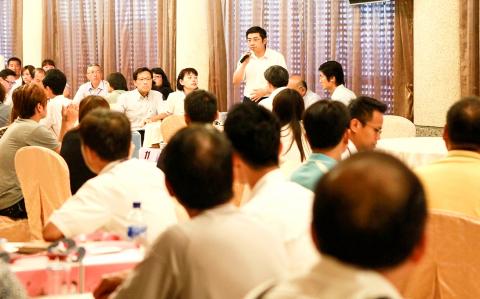TransAsia Airways Corp (TNA, 復興航空) announced yesterday that it would offer NT$14.9 million (US$496,200) each in compensation to the families of 48 passengers and crew who died in the crash of TransAsia Flight GE222 to Penghu last month.
The amount surpasses the highest compensation paid by a Taiwanese airline of NT$14.2 million per victim, which was paid by China Airlines Ltd (中華航空) to the families of the 225 people who died in the Flight CI611 crash of 2002.
Before the final conclusion of investigations into the cause of the crash are made public, TNA reached the decision at a meeting yesterday with families of the victims of the disaster.

Photo courtesy of TransAsia Airways Corp
“As an expression of the company’s highest sincerity, the company decided on the compensation payment by taking into consideration related regulations and precedents internationally and domestically,” the carrier said in a statement.
The Aviation Safety Council, which is leading the investigation into the crash, said it would accelerate the pace of the investigation to make it clear what was responsible for the disaster as soon as possible.
The NT$14.9 million per victim includes an out-of-court settlement of NT$13.5 million, as well as a preliminary pension of NT$200,000 and a funeral subsidy of NT$1.2 million the carrier has already paid.
Families of the people killed have not accepted the offer yet. However, if they decide to do so, TNA losses as a result of the crash would amount to NT$715.2 million. The company has also met the medical expenses and offered other compensation to 10 injured passengers and five Penghu residents.
Part of the compensation for the casualties is set to be covered by aviation insurance, with the amount remaining undecided. TNA did not specify if the compensation payment would impact the company’s business and profitability in the future.
TNA officials are to hold talks with each of the families of the victims to finalize the amount of compensation.
The carrier has posted the highest earnings per share (EPS) for the year among the nation’s three listed airlines on the back of lower operating costs and its expansion of international routes over the past year.
TNA, which operates mainly regional and cross-strait routes, earned NT$158.31 million, or NT$0.29 per share, for the first six months of this year, compared with net losses of NT$186.3 million, or NT$0.34 per share, during the same period last year, the company said in a statement.

Sweeping policy changes under US Secretary of Health and Human Services Robert F. Kennedy Jr are having a chilling effect on vaccine makers as anti-vaccine rhetoric has turned into concrete changes in inoculation schedules and recommendations, investors and executives said. The administration of US President Donald Trump has in the past year upended vaccine recommendations, with the country last month ending its longstanding guidance that all children receive inoculations against flu, hepatitis A and other diseases. The unprecedented changes have led to diminished vaccine usage, hurt the investment case for some biotechs, and created a drag that would likely dent revenues and

Global semiconductor stocks advanced yesterday, as comments by Nvidia Corp chief executive officer Jensen Huang (黃仁勳) at Davos, Switzerland, helped reinforce investor enthusiasm for artificial intelligence (AI). Samsung Electronics Co gained as much as 5 percent to an all-time high, helping drive South Korea’s benchmark KOSPI above 5,000 for the first time. That came after the Philadelphia Semiconductor Index rose more than 3 percent to a fresh record on Wednesday, with a boost from Nvidia. The gains came amid broad risk-on trade after US President Donald Trump withdrew his threat of tariffs on some European nations over backing for Greenland. Huang further

CULPRITS: Factors that affected the slip included falling global crude oil prices, wait-and-see consumer attitudes due to US tariffs and a different Lunar New Year holiday schedule Taiwan’s retail sales ended a nine-year growth streak last year, slipping 0.2 percent from a year earlier as uncertainty over US tariff policies affected demand for durable goods, data released on Friday by the Ministry of Economic Affairs showed. Last year’s retail sales totaled NT$4.84 trillion (US$153.27 billion), down about NT$9.5 billion, or 0.2 percent, from 2024. Despite the decline, the figure was still the second-highest annual sales total on record. Ministry statistics department deputy head Chen Yu-fang (陳玉芳) said sales of cars, motorcycles and related products, which accounted for 17.4 percent of total retail rales last year, fell NT$68.1 billion, or

MediaTek Inc (聯發科) shares yesterday notched their best two-day rally on record, as investors flock to the Taiwanese chip designer on excitement over its tie-up with Google. The Taipei-listed stock jumped 8.59 percent, capping a two-session surge of 19 percent and closing at a fresh all-time high of NT$1,770. That extended a two-month rally on growing awareness of MediaTek’s work on Google’s tensor processing units (TPUs), which are chips used in artificial intelligence (AI) applications. It also highlights how fund managers faced with single-stock limits on their holding of market titan Taiwan Semiconductor Manufacturing Co (TSMC, 台積電) are diversifying into other AI-related firms.